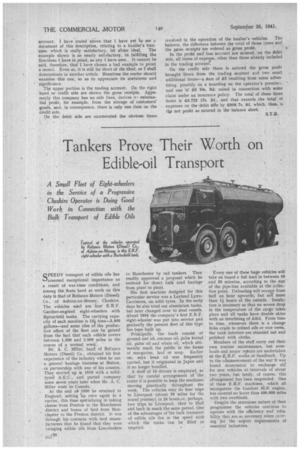Tankers Prove Their Worth on Edible-oil Transport
Page 22

If you've noticed an error in this article please click here to report it so we can fix it.
A Small Fleet of Eight-wheelers in the Service of a Progressive Cheshire Operator is Doing Good Work in Connection with the Bulk Transport of Edible Oils
SSPEEDY transport of edible oils has exceptional importance as a result of war-time conditions, and among the fleets hard at work on this duty is that of Reliance Motors (Diesel) Co., of Ashton-on-Mersey, Cheshire. The vehicles used are four E.R.F. Gardner-engined eight-wheelers with Butterfield tanks. The carrying capacity of each machine is 13i tons-3,400 gallons—and some idea of the productive effort of the fleet can be gained from the fact that each vehicle covers between 1,500 and 2,000 miles in the course of a normal week". •
Mr. A. C. Miller, head of Reliance Motors (Diesel) Co., obtained his first experience of the industry when he ran a general haulage business at Bolton, 'in partnership with one of his cousins.They started up in 1919 with a solidtyred A.E.C., and parted company some seven years later when Mr. A. C. Miller went to Canada.
At the end of 1930 he returned to England, setting *up once again as a carrier, this time spetializing in taking cheese from. Prestonto the Manchester district and boxes of lard from Manchester to the Preston district. It was through his contacts with lard manufacturers that he found that they were bringing edible oils from Lincolnshire
to Manchester by rail tankers. They readily approved a proposal which he evolved for direct bulk road haulage from plant to plant.
His first machine designed for this particular service was a Leyland LynxCarrimore, on solid tyres. In the early days he also tried out aluminium tanks, but later changed over to steel vessels. About 1934 the company's first E.R.F. eight-wheeler was put into service and gradually the present fleet of this type has been built up.
Principally, the loads consist of ground nut oil, coconut oil, palm kernel oil, palm oil and whale oil, which ultimately reach the public in the forms of margarine, lard or soap. Earlier on; soya bean oil was frequently carried, but it originated in japan and is no longer handled.
A staff of 10 drivers is employed, so that by careful arrangement of the roster it is possible to keep the machines moving practically throughout the week. The vehicles may do four trips to Liverpool (about 75 miles for the round journey) in 24 hours.or, perhaps, two trips to Liverpool, then to Hull arid back in much the same period. One of the advantages of'the bulk transport of edible oils lies in the speed with which the tanks can be filled or emptied. Every one of these huge vehicles will take on board a full load in between 10 and 30 minutes, according to the size of the pipe-line available at the collection point. Unloading will occupy from half an hour upwards, but no more than If hours at the outside. Insulation is necessary so that no severe drop in the temperature of the cargo takes place and all tanks have double skins with an interlining of Alfol. From time to time, whenever there is a change frclm crude to refined oils or vice versa, the tank interiors are steamed out and polished with cloths.
Members of the staff carry out their own routine maintenance, but overhauls and major repairs are undertaken at the E.R.F. works at Sandbaeh. Up to the cOrnmencement of the war it was found economical to exchange old for new vehicles at intervals of about two years, but lately, of course, this afrangement has been suspended. One of these E.R.F. machines, which all incorporate the Gardner 6T,K engine, has covered no fewer than 400,000 miles with two overhauls.
'Despite the strenuous nature of their programme the vehicles continue to operate with the efficiency and reliability that are so necessary when catering for the urgent requirements of essential industries.




















































